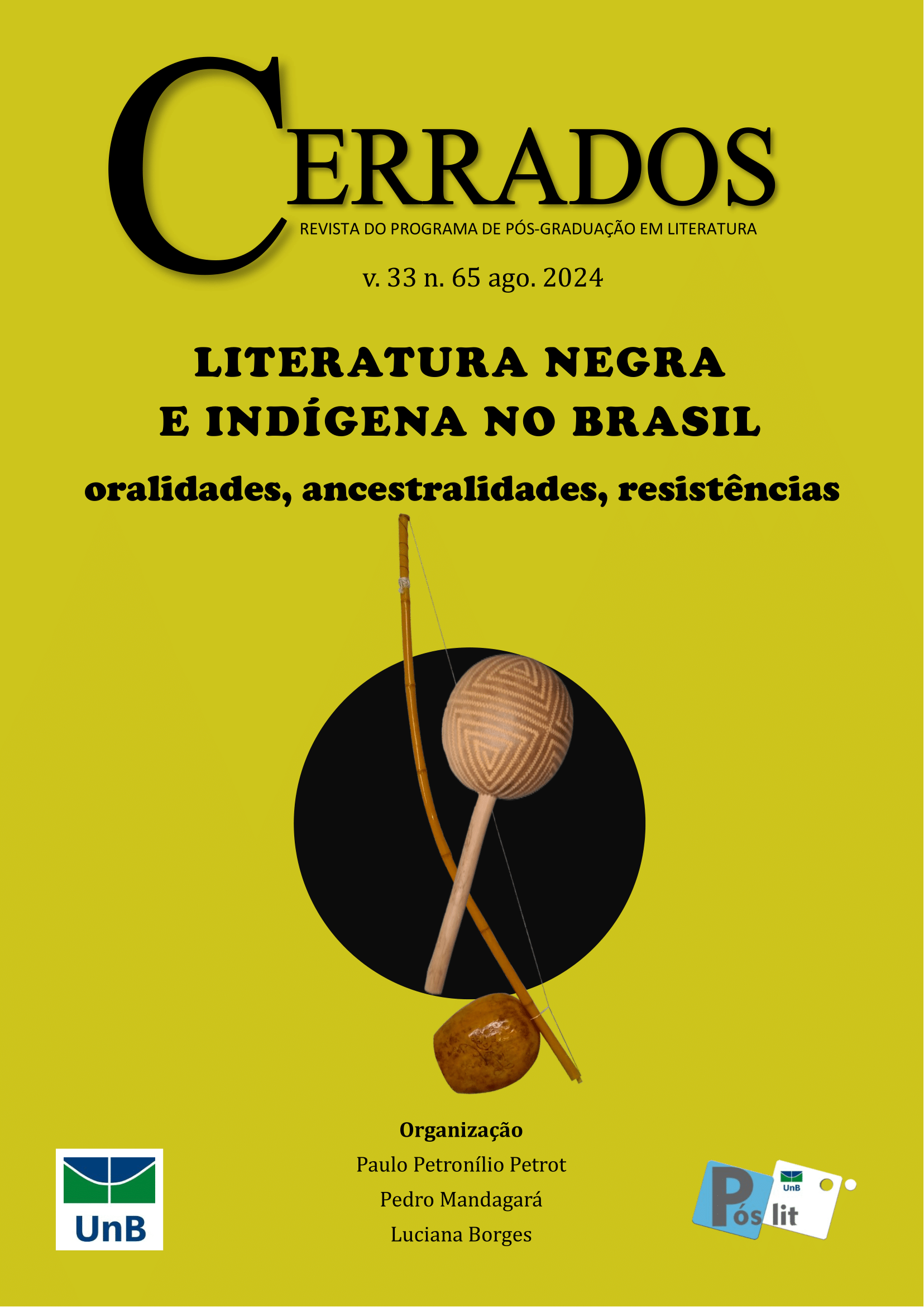Identity, sexuality and ancestry
a reading of the cordel poem “Iracema Tabajara”, by Auritha Tabajara
DOI:
https://doi.org/10.26512/cerrados.v33i65.53990Keywords:
Iracema Tabajara, Poetry written by indigenous women, suggested reading for the classroomAbstract
The purpose of this article is to read the cordel poem “Iracema tabajara”, by the indigenous poet Auritha Tabajara, from an intercultural and pedagogical perspective, as she approaches the identity value of her ancestry, sexuality and Indianness from the perspective of difference. In its critical legibility, the poem deconstructs the subalternized image of the Brazilian indigenous woman that has crystallized in Indianist works, removing her from her subjection, invisibility and silencing, and then restoring her through her struggle, her song and her memory, from the perspective of a contemporary and intercultural episteme that is enunciated through the poetic. In this work, we will engage with the thinking of authors such as Walter Mignolo (2017, 2020), Daniel Munduruku (2012), Giorgio Agamben (2009) and Catherine Walsh (2009), in order to produce a critical substrate of literary, political and pedagogical relevance, focusing on reading strategies that can stimulate the experience of these texts in the classroom.
Downloads
References
AGAMBEN, G. O que é o contemporâneo? e outros ensaios. Tradução: Vinícius N. H. Chapecó, SC: Argos, 2009.
ALENCAR, José de. Iracema. 24. ed. São Paulo: Ática, 1991.
BRASIL. Lei nº 11.645, de 10 de março de 2008. Altera a Lei no 9.394, de 20 de dezembro de 1996, modificada pela Lei no 10.639, de 9 de janeiro de 2003, que estabelece as diretrizes e bases da educação nacional, para incluir no currículo oficial da rede de ensino a obrigatoriedade da temática “História e Cultura Afro-Brasileira e Indígena”, Brasília, DF: Senado Federal, 2008. Disponível em: https://www.planalto.gov.br/ccivil_03/_ato2007-2010/2008/lei/l11645.htm. Acesso em: 10 de jan. 2024.
HAURÉLIO, M. Literatura de cordel: do sertão à sala de aula. São Paulo: Paulus, 2013.
MARINHO, A. C.; PINHEIRO, H. O cordel no cotidiano escolar. São Paulo: Cortez, 2012.
MIGNOLO, W. Desafios decoloniais hoje. Revista Epistemologias do Sul, Foz do Iguaçu, n. 1, v. 1, p. 12-32, 2017.
MIGNOLO, W. Pensamento liminar e diferença colonial. In. Histórias locais, projetos globais: colonialidade, saberes subalternos e pensamento liminar. Belo Horizonte: UFMG, p. 79-130, 2020.
MUNDURUKU, D. Literatura indígena e as novas tecnologias da memória. In: LEETRA Indígena. São Paulo: Universidade Federal de São Carlos, Laboratório de Linguagens LEETRA, n. 1, v. 1, 2012.
NIETZSCHE, F. Sobre a utilidade e a desvantagem da história para a vida: segunda consideração extemporânea. Tradução de André L. M. I. São Paulo: Hedra, 2017.
TABAJARA, A.; BORGES , L. Inéditos. Revista E, São Paulo, n. 2, p. 73, 2023. Disponível em: https://www.sescsp.org.br/ineditos-poemas-em-cordel-assinados-por-auritha-tabajara-e-ilustracoes-de-lucelia-borges/#agosto23-integra. Acesso em: 29 jan. 2024.
WALSH, C. Interculturalidade Crítica e Pedagogia Decolonial: in-surgir, re-existir e re-viver. In: CANDAU, V. M. (Org.) Educação Intercultural na América Latina: entre concepções, tensões e propostas. Rio de Janeiro: 7 Letras, 2009.
Downloads
Published
How to Cite
Issue
Section
License
Copyright (c) 2024 Revista Cerrados

This work is licensed under a Creative Commons Attribution 4.0 International License.
Proibida a reprodução parcial ou integral desta obra, por qualquer meio eletrônico, mecânico, inclusive por processo xerográfico, sem permissão expressa do editor (Lei n. 9.610 de 19/2/1998 )



